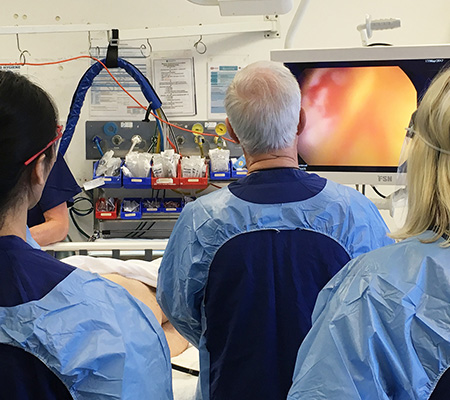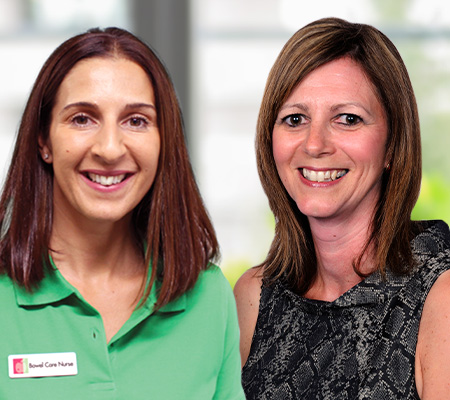Fertility options after cancer treatment will depend upon your age and whether you have been through premature ovarian failure or early menopause.
When you are ready to start a family, you may need fertility treatment to have a baby.
Although there are no tests that can reliably predict whether you will be able to fall pregnant and if the pregnancy will be successful, a cancer or fertility specialist will be able to talk to you about your likely fertility status after treatment and any fertility treatment options available.
Family building options after bowel cancer treatment
Not all women will be able or want to freeze eggs or embryos before beginning cancer treatment. However, if you are no longer fertile after treatment, there are still ways to become a parent.
Alternative routes to parenthood can include using donor eggs, surrogacy, and adoption.
The legal and financial implications of these options can be considerable. However, patients should be informed about all the options available to them before beginning treatment, so as to make the best decision they can for their current and future personal circumstances.
| Pregnancy and motherhood
Bowel cancer in pregnancy is distinct from bowel cancer in the general population.
Pregnancy-associated cancer refers to the instance when the initial diagnosis of cancer is made during pregnancy or within 12 months of delivery.
Cancer is a leading cause of death in women in childbearing ages, and bowel cancer is among the eight most common malignancies in pregnancy.
Pregnant patients typically present with advanced bowel cancer, which is usually due to delayed diagnosis.
Patients frequently delay self-referral. Common presenting symptoms of bowel cancer include abdominal pain, constipation, vomiting, anaemia, and rectal bleeding; most of these symptoms might be attributed to pregnancy itself and are therefore overlooked. Rectal bleeding can also be attributed to haemorrhoids, which are common in pregnant women.
Specialists may delay diagnostic tests because of inattention to the potential significance of symptoms owing to the relative rarity of bowel cancer in this young population, and potential foetal risks.
For these reasons, most cases of bowel cancer are diagnosed later in pregnancy when more widespread metastasis has occurred.
Arguably, pregnancy should provide an opportunity to diagnose bowel cancer earlier than usual in the general population because of frequent routine doctor visits by the pregnant patient to the specialist. However, this often is sadly not the case.
As the presenting features of bowel cancer can overlap with those of pregnancy itself, there is a risk of development of advanced disease, with poorer prognosis at diagnosis.
You are never too young to have bowel cancer, and bowel cancer is being diagnosed in women while pregnant or shortly afterwards.
No one knows your body better than you, so regardless of whether you are pregnant or not, if something isn’t right and you are experiencing any possible bowel cancer symptoms, discuss your concerns with your doctor as soon as possible.
If caught in time, almost 99 per cent of bowel cancer cases can be successfully treated.
It is important not to miss critical diagnoses that might put both mother and baby at serious health risk.
Bowel cancer diagnosis and treatment during pregnancy
Pregnancy affects the clinical presentation, evaluation, therapy, and prognosis of bowel cancer.
When diagnosis of bowel cancer is made during pregnancy, multidisciplinary involvement of the obstetrician, perinatologist, colorectal surgeon, and radiation and medical oncologists is essential to achieving the goal of early delivery that allows for the earliest treatment of the patient’s cancer.
In situations in which therapeutic intervention is necessary at patient diagnosis, the stage of the pregnancy can have an impact on the types of procedures (e.g. radiologic and endoscopic intervention) and medications used (e.g. sedatives). However, once diagnosed, the evaluation of pregnant patients with bowel cancer is similar to the evaluation of nonpregnant patients.
Treatment and prognosis by cancer stage are not different from those in the general population. However, there are several factors to consider when planning management of the cancer treatment, the types of treatments used and when they are administered, including the location of the cancer, gestational age, elective versus emergency presentation, the stage of the tumour, complications of tumour or pregnancy, and the patient’s decision.
There are still lots of unanswered questions
The exact reasons for why bowel cancer is often diagnosed in more advanced stages during pregnancy is still associated with lots of unanswered questions.
A possible association between neoplastic cell growth and proliferation and gestation may have a role in the pathogenesis of bowel cancer in pregnancy. Maybe the increased levels of estrogen and progesterone during pregnancy stimulate the growth of tumoral cells with such receptors. Similarly, the enzyme cyclocoxygenase-2 (Cox-2), and tumour suppressor protein p53 have been implicated in the carcinogenesis of bowel cancer in pregnancy. However, further research is required.
Research indicates that most diagnosed cases of bowel cancer in pregnancy are rectal carcinomas, below the peritoneal reflection. However, this may reflect a detection bias due to rectal exams performed during routine antenatal care.
Cases of familial adenomatous polyposis have also been reported to be first diagnosed during pregnancies.
Bowel Cancer Australia Helpline
If you are worried about any aspect of bowel cancer – whether you have symptoms and you don't know what to do; or if you have been diagnosed or have questions about treatment options. Whatever the reason, please don't hesitate to contact one of our friendly, trained Bowel Care Nurses.
| Body acceptance
Diagnosed with Stage IV bowel cancer and secondary liver cancer at the age of 24, Hollie Fielder was told she had a five percent chance to be alive in five years. But in an inspiring story of ‘beating the odds’ - after two major operations on her bowel and liver, and six months of chemotherapy, Hollie was given the all clear and recently celebrated seven years since her diagnosis.
Now begins another journey. As Hollie adjusts to her new normal the journey of self-acceptance and self-love begins.
A bowel cancer diagnosis and the treatments that follow not only have an impact on the physical, but the mental as well. Coming to terms with scars from operations and treatments, adjusting to stomas (whether temporary or permanent), living through some of the more extreme side effects of treatments, embarrassment around changes in bowel habits following bowel surgery and so on, all can have an impact on body image and how you feel about yourself.
As someone who has been through it all and is now making a concerted effort to focus on self-awareness and acceptance, we asked Hollie to share a few words about the journey to self-love and learning to accept and appreciate your body following a bowel cancer diagnosis.
Self-love: Hollie’s kick ass story
Going through cancer was a journey in itself. Learning to love and accept the ‘new’ me and my ‘new’ body was another journey all together.
Learning to accept my body post-cancer was a silent battle for me. I loved how much it had been through, I adored the strength it showed, I appreciated it, but I couldn’t find a way to accept the changes.
I fell into denial of this new body that I had and craved to have my old body. I wanted to be able to do things I used to do, I wanted to train without restrictions, I wanted to have the energy I used to, I wanted to be able to eat foods and not have to run to the toilet, I wanted to remove the acne from my face and hide away.
It was an endless cycle of feeling lost but wanting to feel at home in my body. I would avoid the mirrors, cover my scars, stress about the weight gain, live in anxiety and pretend everything was ok but on the inside, I was screaming. The struggle was real and I wanted it to end. I remember thinking to myself, who would love someone with scars like these, how could I ever find a partner when I had been through cancer and that’s when I realised I needed to love and accept myself before I could allow someone else to love me.
It’s so easy to get caught up on the comparison trap to who we used to be before cancer or to what everyone else is doing in their life, but that doesn’t serve us. It only causes us more pain. We aren’t given the tools to accept the new changes in our lives and our bodies, it’s up to us to accept them and that was the biggest learning for me.
I could spend my days wishing to have my old life back and comparing myself to what I used to be able to do or what I used to look like or I could swap it for compassion. I could appreciate the body I have, how amazing it is, how strong it is, how brave it is, how resilient it is, how empowered it is, because that’s what I deserved. I deserved to feel good about myself and so do you.
I understand how hard it is to process the changes and to accept what you have been through, but it’s needed. It has happened and learning to accept your changes empowers you to love who you are. I learnt that focusing on what I do have, rather than what I don’t have, is a big must in accepting who we are. Giving your energy to the present moment rather than the past will make you feel good, it will shift your awareness to what’s working rather than what’s not, and help you find ways to love and accept your body even more.
The acceptance journey doesn’t happen overnight, it’s a continuous commitment to yourself and to your healing. There will be harder days than others, but you need to remind yourself of how amazing you are and everything you have been through and know that who you are right now is enough.
Choosing to accept yourself as you are with all the parts that may not be what you want is self-empowering, because this is your life. For me I know I would rather spend my second chance at life loving and accepting who I am rather than wish to be something else.
I know that it is up to me to make this life as fulfilling and loving as I can and that I always have a choice in how I choose to see myself and I choose to see the best me always. I choose to see beyond the external and see within to my soul.
Just remember that because you are different on the outside, maybe some scars, a colostomy bag, acne, weight gain or loss, hair thinning, low energy you are still the same amazing inspirational woman on the inside.
Your external shell doesn’t change who you are, it doesn’t define your worth or make you less than enough. Who you are comes from within.
Remember this - there is nothing wrong with who you are, you just need to reconnect back to yourself, accept yourself and love yourself.
Here are some tips with you to help you continue or begin this journey for yourself:
- Let go of who you think you should be, who you used to be and allow yourself to embody and live life with the new changes in your body
- Practice gratitude, every day. List 3 things you are grateful and WHY (the why connects you to the feeling of gratitude)
- Mirror work every day, stand in front of the mirror and appreciate how amazing your body is, forgive it, thank it and love it. (This may be confronting, but so healing)
- Journal your thoughts, brain dump all your worries, anxieties and fears its always better out than in
- Write yourself a love letter
Remember your body is amazing and loving who you are is a human need.
Empowering advice through lived experience
“Don't hide your scars. Use them for strength, use them to remember how amazing your body is and what it is capable of. Welcome the questions....open the conversation about bowel cancer and help to raise awareness and remove the stigma associated with it. I’m proud of my scars.” ~ Shannon
“Your body will change, and change forever. But this change will save your life. The change sucks but you adapt to it and fit life in your new body. Love your body and it’s new way bowel cancer treatments make it!” ~ Shelley
“It is completely valid to grieve your pre-cancer body but try not to make comparisons to your new body. It took me time to accept the changes chemo and surgery caused, but over time I’ve grown to love my scars that represent what I’ve overcome.” ~ Sofiah
| Wake up. Kick bowel cancer's ass. Repeat.
It is a common misconception that bowel cancer is an old man’s disease. Yet the reality is, bowel cancer affects women of all ages, and almost half of all people diagnosed with bowel cancer in Australia each year are women.
Bowel cancer is the third most commonly diagnosed cancer in Aussie women, claiming the lives of more than 2,500 wives, mothers, sisters, daughters, aunts, nieces and girlfriends in Australia every year.
Possible bowel cancer signs can often be dismissed as being associated with pregnancy or recent childbirth, endometriosis, menstruation, menopause, perimenopause, or simply being a busy mum with young children.
But the good news is that almost 99% of bowel cancer cases can be successfully treated when detected early.
That's why Bowel Cancer Australia is calling on all Aussie women to help us kick bowel cancer’s ass!
Celebrating International Women's Day
In celebration of International Women’s Day (8 March), Bowel Cancer Australia raises awareness of bowel cancer in women and shares empowering stories from Aussie women who are kicking bowel cancer’s ass.
Join our campaign to increase awareness of bowel cancer in women and show your support for all the kick ass women living with or beyond bowel cancer and help save lives.
Bowel Cancer Australia's goal is to have a lasting impact on our health future - where no one dies of bowel cancer and all those diagnosed receive the support they need.
| Share your kick ass story
Are you a kick ass woman living with or beyond bowel cancer, or do you have a female family member or friend that is?
We’re seeking female volunteers of all ages to share their experiences to help raise awareness of bowel cancer in women, show support for all the kick ass Aussie women currently living with or beyond bowel cancer, and help save lives.
Tell your story and help us kick bowel cancer’s butt.
Since the campaign launched in 2018, a number of kick ass women living with or beyond bowel cancer and their loved ones have shared their empowering stories.
Helping to increase awareness of bowel cancer in women, challenging misconceptions around the disease, supporting women around the country living with bowel cancer, and helping to save lives.
Host a kick ass awareness and fundraising event
Get together with your mothers, sisters, grandmothers, aunts, nieces, cousins and girlfriends and host a kick ass event to raise much needed funds and awareness for Bowel Cancer Australia.
We know that diet and lifestyle have a role to play in bowel cancer risk, so we encourage you to incorporate some physical activity and healthy food choices into your event.
Add a few healthy snacks to your high tea or ladies’ dinner party or organise a group session of walking, yoga, pilates, swimming, running, Zumba or Tai Chi.
Looking for an excuse for a girlie getaway - why not extend your awareness and fundraising activities into a weekend retreat!
Celebrate your kick ass mum on Mother’s Day
Mother's Day provides a lovely opportunity to celebrate all the wonderful Mums out there and also to remember the special Mums who are no longer with us.
It's a gift of hope for the future, a future where more families can stay together for longer and celebrate special days like Mother's Day together.
And don't forget - Mother's Day is also a great opportunity to spread the important bowel cancer awareness message to your Mum and Grandma.














